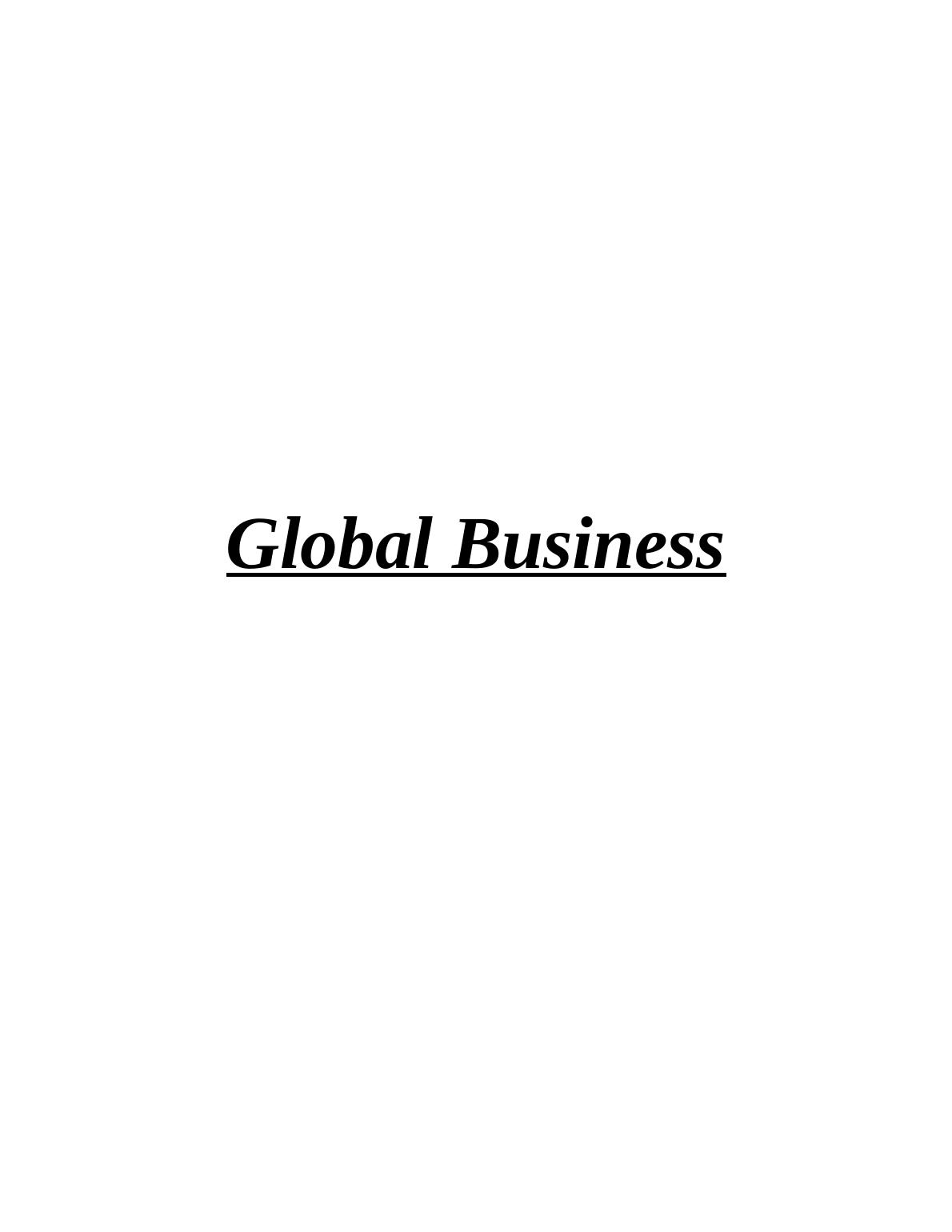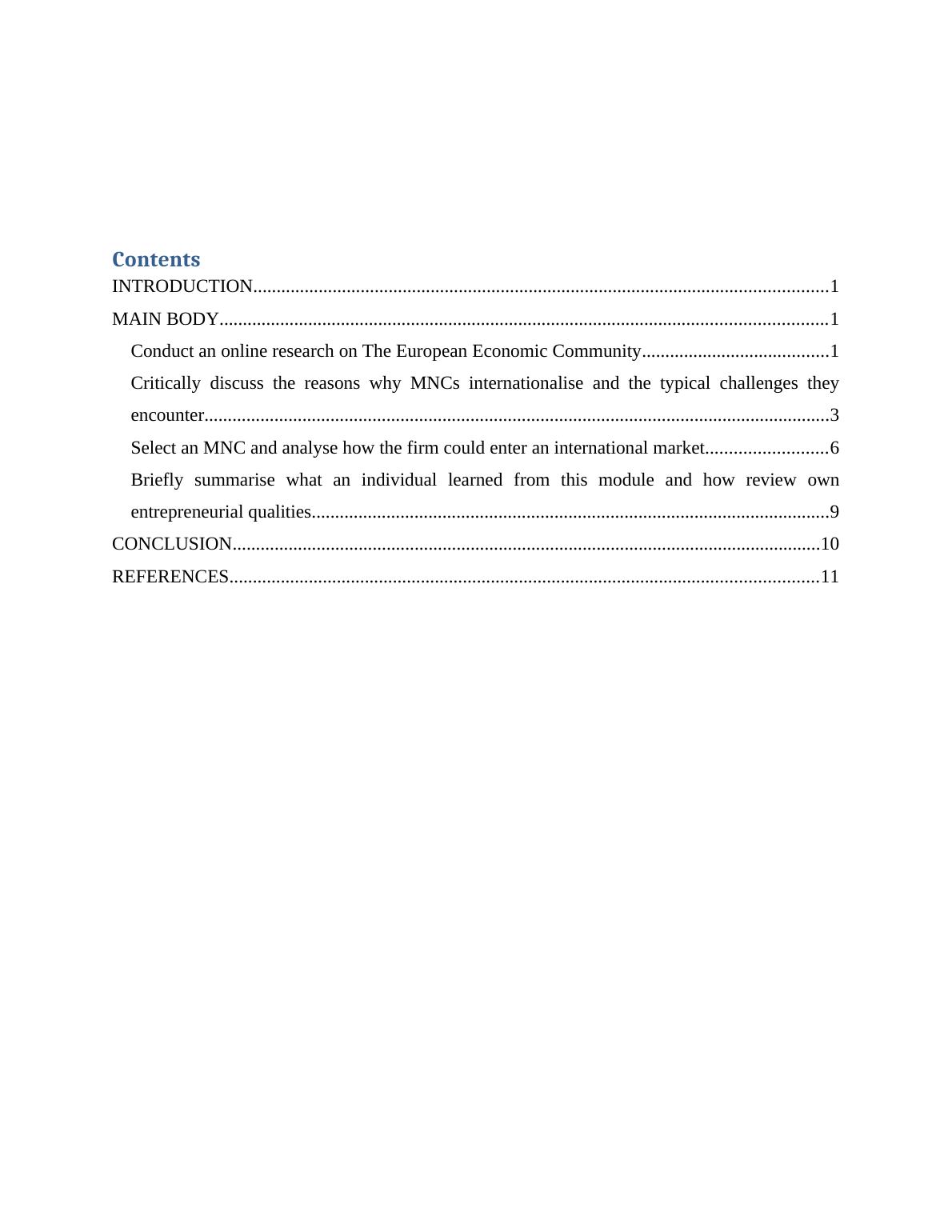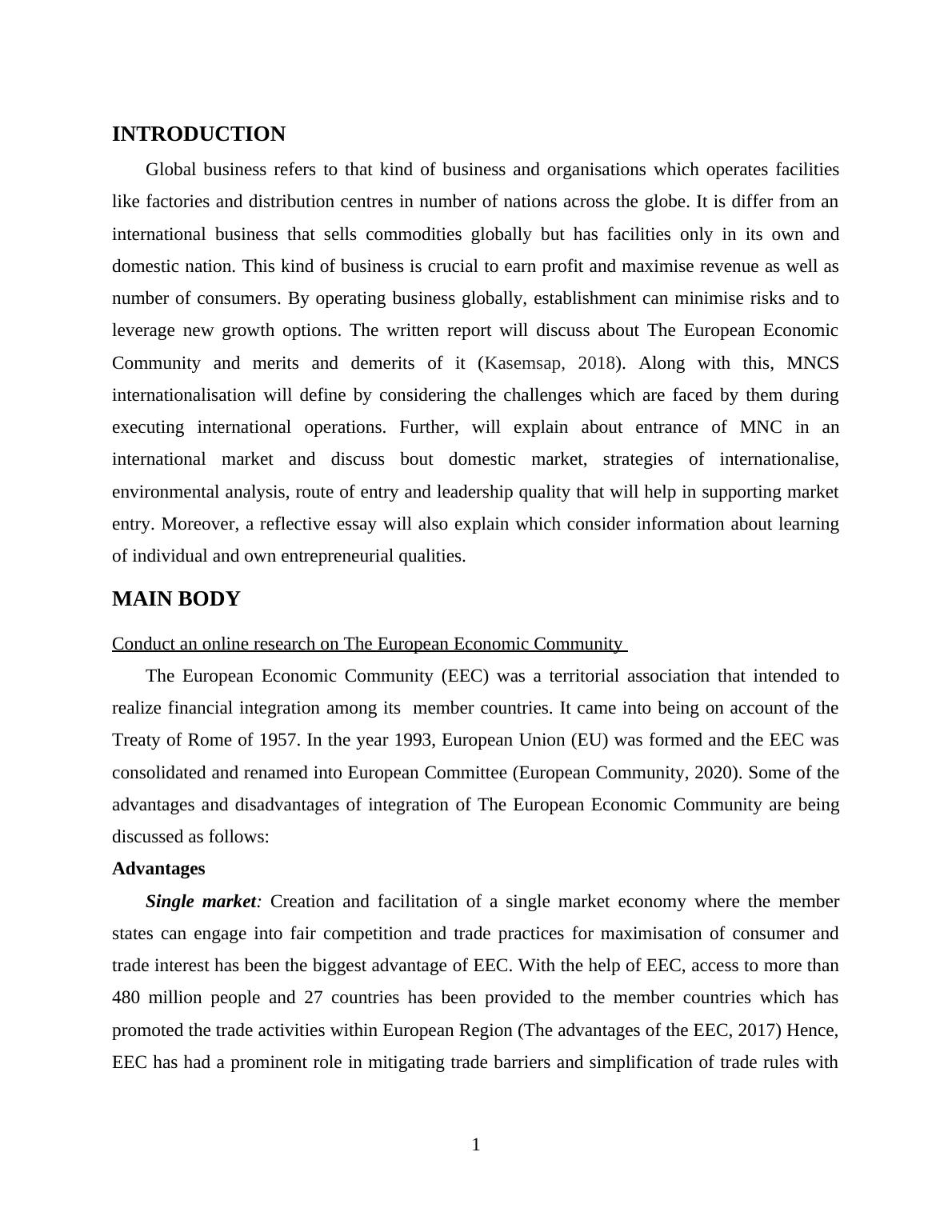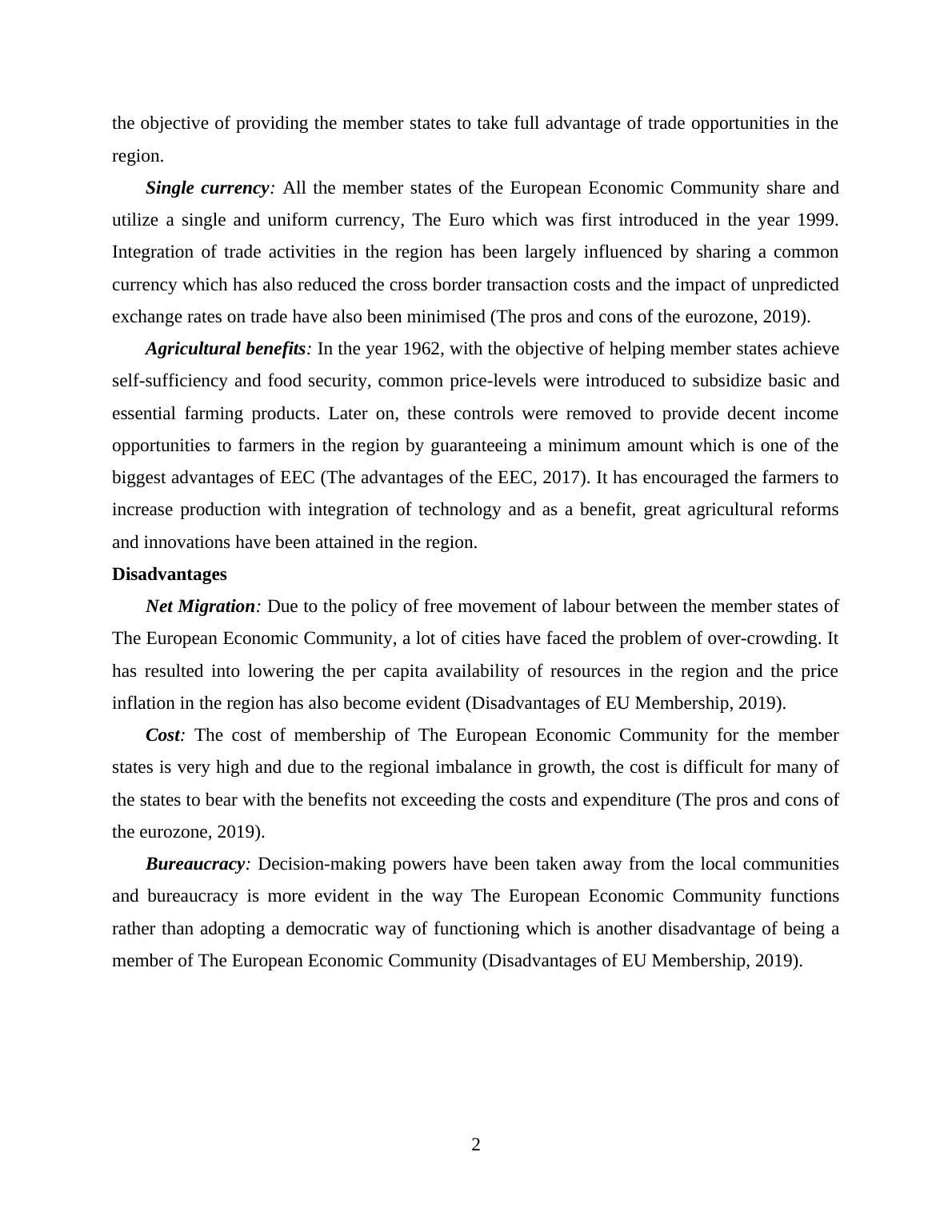Global Business: The European Economic Community, MNCs Internationalisation, and Market Entry Analysis of Tesco
Added on 2023-01-10
16 Pages5328 Words85 Views
Global Business

Contents
INTRODUCTION...........................................................................................................................1
MAIN BODY..................................................................................................................................1
Conduct an online research on The European Economic Community........................................1
Critically discuss the reasons why MNCs internationalise and the typical challenges they
encounter......................................................................................................................................3
Select an MNC and analyse how the firm could enter an international market..........................6
Briefly summarise what an individual learned from this module and how review own
entrepreneurial qualities...............................................................................................................9
CONCLUSION..............................................................................................................................10
REFERENCES..............................................................................................................................11
INTRODUCTION...........................................................................................................................1
MAIN BODY..................................................................................................................................1
Conduct an online research on The European Economic Community........................................1
Critically discuss the reasons why MNCs internationalise and the typical challenges they
encounter......................................................................................................................................3
Select an MNC and analyse how the firm could enter an international market..........................6
Briefly summarise what an individual learned from this module and how review own
entrepreneurial qualities...............................................................................................................9
CONCLUSION..............................................................................................................................10
REFERENCES..............................................................................................................................11

INTRODUCTION
Global business refers to that kind of business and organisations which operates facilities
like factories and distribution centres in number of nations across the globe. It is differ from an
international business that sells commodities globally but has facilities only in its own and
domestic nation. This kind of business is crucial to earn profit and maximise revenue as well as
number of consumers. By operating business globally, establishment can minimise risks and to
leverage new growth options. The written report will discuss about The European Economic
Community and merits and demerits of it (Kasemsap, 2018). Along with this, MNCS
internationalisation will define by considering the challenges which are faced by them during
executing international operations. Further, will explain about entrance of MNC in an
international market and discuss bout domestic market, strategies of internationalise,
environmental analysis, route of entry and leadership quality that will help in supporting market
entry. Moreover, a reflective essay will also explain which consider information about learning
of individual and own entrepreneurial qualities.
MAIN BODY
Conduct an online research on The European Economic Community
The European Economic Community (EEC) was a territorial association that intended to
realize financial integration among its member countries. It came into being on account of the
Treaty of Rome of 1957. In the year 1993, European Union (EU) was formed and the EEC was
consolidated and renamed into European Committee (European Community, 2020). Some of the
advantages and disadvantages of integration of The European Economic Community are being
discussed as follows:
Advantages
Single market: Creation and facilitation of a single market economy where the member
states can engage into fair competition and trade practices for maximisation of consumer and
trade interest has been the biggest advantage of EEC. With the help of EEC, access to more than
480 million people and 27 countries has been provided to the member countries which has
promoted the trade activities within European Region (The advantages of the EEC, 2017) Hence,
EEC has had a prominent role in mitigating trade barriers and simplification of trade rules with
1
Global business refers to that kind of business and organisations which operates facilities
like factories and distribution centres in number of nations across the globe. It is differ from an
international business that sells commodities globally but has facilities only in its own and
domestic nation. This kind of business is crucial to earn profit and maximise revenue as well as
number of consumers. By operating business globally, establishment can minimise risks and to
leverage new growth options. The written report will discuss about The European Economic
Community and merits and demerits of it (Kasemsap, 2018). Along with this, MNCS
internationalisation will define by considering the challenges which are faced by them during
executing international operations. Further, will explain about entrance of MNC in an
international market and discuss bout domestic market, strategies of internationalise,
environmental analysis, route of entry and leadership quality that will help in supporting market
entry. Moreover, a reflective essay will also explain which consider information about learning
of individual and own entrepreneurial qualities.
MAIN BODY
Conduct an online research on The European Economic Community
The European Economic Community (EEC) was a territorial association that intended to
realize financial integration among its member countries. It came into being on account of the
Treaty of Rome of 1957. In the year 1993, European Union (EU) was formed and the EEC was
consolidated and renamed into European Committee (European Community, 2020). Some of the
advantages and disadvantages of integration of The European Economic Community are being
discussed as follows:
Advantages
Single market: Creation and facilitation of a single market economy where the member
states can engage into fair competition and trade practices for maximisation of consumer and
trade interest has been the biggest advantage of EEC. With the help of EEC, access to more than
480 million people and 27 countries has been provided to the member countries which has
promoted the trade activities within European Region (The advantages of the EEC, 2017) Hence,
EEC has had a prominent role in mitigating trade barriers and simplification of trade rules with
1

the objective of providing the member states to take full advantage of trade opportunities in the
region.
Single currency: All the member states of the European Economic Community share and
utilize a single and uniform currency, The Euro which was first introduced in the year 1999.
Integration of trade activities in the region has been largely influenced by sharing a common
currency which has also reduced the cross border transaction costs and the impact of unpredicted
exchange rates on trade have also been minimised (The pros and cons of the eurozone, 2019).
Agricultural benefits: In the year 1962, with the objective of helping member states achieve
self-sufficiency and food security, common price-levels were introduced to subsidize basic and
essential farming products. Later on, these controls were removed to provide decent income
opportunities to farmers in the region by guaranteeing a minimum amount which is one of the
biggest advantages of EEC (The advantages of the EEC, 2017). It has encouraged the farmers to
increase production with integration of technology and as a benefit, great agricultural reforms
and innovations have been attained in the region.
Disadvantages
Net Migration: Due to the policy of free movement of labour between the member states of
The European Economic Community, a lot of cities have faced the problem of over-crowding. It
has resulted into lowering the per capita availability of resources in the region and the price
inflation in the region has also become evident (Disadvantages of EU Membership, 2019).
Cost: The cost of membership of The European Economic Community for the member
states is very high and due to the regional imbalance in growth, the cost is difficult for many of
the states to bear with the benefits not exceeding the costs and expenditure (The pros and cons of
the eurozone, 2019).
Bureaucracy: Decision-making powers have been taken away from the local communities
and bureaucracy is more evident in the way The European Economic Community functions
rather than adopting a democratic way of functioning which is another disadvantage of being a
member of The European Economic Community (Disadvantages of EU Membership, 2019).
2
region.
Single currency: All the member states of the European Economic Community share and
utilize a single and uniform currency, The Euro which was first introduced in the year 1999.
Integration of trade activities in the region has been largely influenced by sharing a common
currency which has also reduced the cross border transaction costs and the impact of unpredicted
exchange rates on trade have also been minimised (The pros and cons of the eurozone, 2019).
Agricultural benefits: In the year 1962, with the objective of helping member states achieve
self-sufficiency and food security, common price-levels were introduced to subsidize basic and
essential farming products. Later on, these controls were removed to provide decent income
opportunities to farmers in the region by guaranteeing a minimum amount which is one of the
biggest advantages of EEC (The advantages of the EEC, 2017). It has encouraged the farmers to
increase production with integration of technology and as a benefit, great agricultural reforms
and innovations have been attained in the region.
Disadvantages
Net Migration: Due to the policy of free movement of labour between the member states of
The European Economic Community, a lot of cities have faced the problem of over-crowding. It
has resulted into lowering the per capita availability of resources in the region and the price
inflation in the region has also become evident (Disadvantages of EU Membership, 2019).
Cost: The cost of membership of The European Economic Community for the member
states is very high and due to the regional imbalance in growth, the cost is difficult for many of
the states to bear with the benefits not exceeding the costs and expenditure (The pros and cons of
the eurozone, 2019).
Bureaucracy: Decision-making powers have been taken away from the local communities
and bureaucracy is more evident in the way The European Economic Community functions
rather than adopting a democratic way of functioning which is another disadvantage of being a
member of The European Economic Community (Disadvantages of EU Membership, 2019).
2

End of preview
Want to access all the pages? Upload your documents or become a member.
Related Documents
Reasons for MNC Internationalisation and Challenges Encounteredlg...
|15
|5059
|41
Multinational Corporations: Advantages, Disadvantages, and International Expansionlg...
|17
|4824
|81
The European Economic Community (EEC): Pros, Cons, and Challengeslg...
|17
|5090
|31
Reasons for MNCs internationalisation and challenges they encounterlg...
|17
|5460
|206
Desklib - Online Library for Study Material with Solved Assignments, Essays, Dissertationslg...
|16
|5029
|379
Advantages and Disadvantages of Joining EEC, Reasons for MNCs Internationalization and Challenges Faced, and Internationalization Strategy for Marks and Spencer in Monacolg...
|14
|4836
|316
